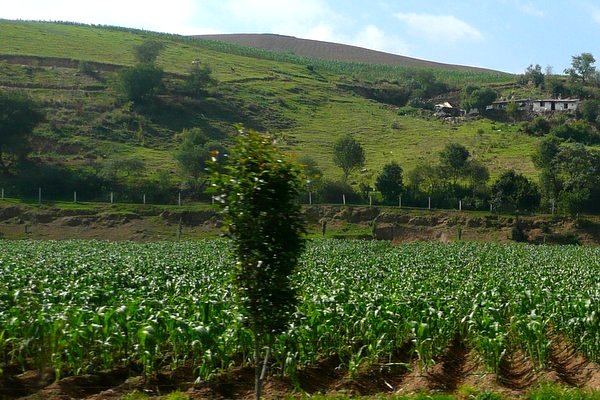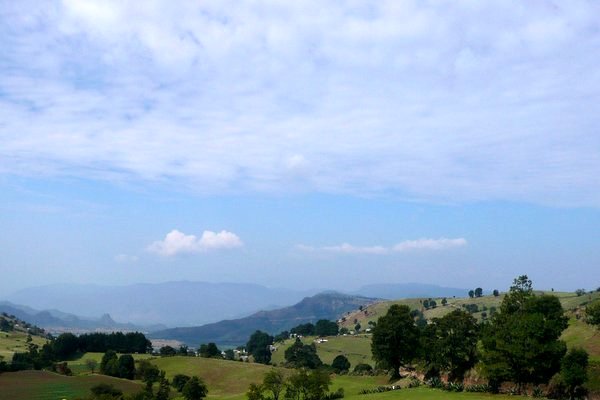In my searches for on-line resources on organic gardening and nutrition, I’ve come across many specifically Mexican sites that are full of useful and interesting information about organic products, sustainable agriculture, and ecological trends in Mexico.
I’d like to share a few of my most interesting and useful finds. This is by no means a comprehensive list of resources, only a sharing of sites I found that helped extend the reach of my knowledge of what’s happening in the world of organics in Mexico.
Many of the sites are only in Spanish as they are directed toward the Mexican public and national organic industry, but some also include information in English.

Organic Agriculture in Mexico and in the World
An article on organic agriculture viewable at http://www.biodiversidad.gob.mx/Biodiversitas/Articulos/biodiv55art3.pdf states:
“En el país se cultivan más de 45 productos orgánicos, de los cuales el café es el más importante por superficie cultivada [More than forty-five organics products are cultivated in the country, of which coffee is the most important in terms of cultivated area].”
–Gómez Tovar, L. y M.A. Gómez Cruz. 2004. La agricultura orgánica en México y en el mundo. CONABIO. Biodiversitas 55: 13-15
The article goes on to list these other products, in order of greatest-to-least cultivated area: blue and white maize (corn), sesame seeds, agave, herbs, mangoes, oranges, beans, apples, papayas, and avocados. Lesser crops include soy, bananas, cacao, vanilla, peanuts, pineapple, jamaica (hibiscus), limes, coconut, pecans, litchis, garbanzos, passion fruit, and peaches.
Of course, the above article was written several years ago. Mexico has a much more extensive organic product base now, and it continues to grow.
For example, Campo Vivo handles a line of organic products for distribution in self-service stores and supermarkets in Mexico. Their wide variety of fresh produce comes from certified growers fourteen different states of the republic. See http://www.campovivo.com.mx/ for the list of fruits and vegetables and where they’re grown.
In Zihuatanejo, Campo Vivo products are distributed by Comercial Mexicana.
Campo Mexicano Nacional is the portal for the Sistema Nacional de Información para el Desarrollo Rural Sustentable (National Information System for Sustainable Rural Development) under the auspices of SAGARPA (the Mexican ministry of agriculture, livestock, rural development, fisheries, and food) and serves as a directory for the sub-sites of each state of the republic (see http://www.campomexicano.gob.mx).
The state sub-sites offer comprehensive information and statistics on local products, agricultural development, and sustainability, as well as geographical data, climate data, and agricultural monographs.
Laws and Regulations
The USDA Foreign Agricultural Service Mexico website provides Mexico’s new labeling regulations in both Spanish and English. Also on the site is a GAIN (Global Agricultural Information Network) report regarding Mexico’s new organic policy and program announcements.
The CCOF (California Certified Organic Farmers) Trade Association of the United States provides an outline en English and Spanish of the Mexican organic production guidelines that were finalized at the end of October, 2013.
The Global Organic Trade Guide: Mexico also provides downloads of the Law of Organic Products, Regulations to the Organic Products Act, Guidelines of Organic Agricultural Activities, as well as other general files in Spanish and English.
SOMEXPRO, la Sociedad Mexicana de Producción Orgánica, A.C. (Mexican Society of Organic Production) is a national forum for the organization and planning of the Mexican organic movement whose members are producers, processors, consumers, promoters, certification agencies, and academics within Mexico’s organic sector.
On their website are PDF files detailing the laws and regulations that govern organic products and operations in Mexico, SAGARPA guides, and links to certification authorities.

Impulso Orgánico Mexicano, A.C. is an alliance of certified organic food growers and producers in Mexico. Their website includes information on organic trade shows, product expos, and symposiums, as well directories of retail and wholesale suppliers of organic goods and of authorized Mexican organic certifying agents.
See http://www.impulsoorganicomexicano.com
Upcoming events:
May 28, 2014: Simposio Alimentos Organicos en la Salud (Symposium of Organic Foods in Health). See http://events.r20.constantcontact.com/register/event?oeidk=a07e91gcy2gd34c120b&llr=p97zsccab
Junio 25-27, 2014: 13 Expo Orgánicos in Mexico City. See http://www.exporganicos.com.mx/
Cultura Organica is a magazine offering articles about all aspects of organic cultivation, products, certification, events, and lifestyle, distributed in Mexico, Canada, and the United States.
http://www.culturaorganica.com/
Las Páginas Verdes (http://laspaginasverdes.com) is a Latin-American site for all things green; a directory of outlets and services (viewable on-line as well as downloadable) for everything from home and garden products to food and beverages, from consulting services to cleaning supplies, from electronics to office furniture.
Las Páginas Verdes organizes the yearly Ecofest–a green festival of sustainable products that in 2014 took place on the Paseo de la Reforma in Mexico City on March 22 and 23. The ecological community and educational festival included workshops, conferences, sports events, and cultural activities focusing on the community, food and drink, energy usage, water usage, and waste disposal.
This year it is also organizing SectorVerde, a green products trade fair for sustainable purchases, aimed at educating and creating opportunities for government agencies, corporations, hotels, restaurants, etc., to move into sustainable and ecological buying practices. The trade fair will take place on June 3, 4, and 5 at Expo Santa Fe, Mexico City.